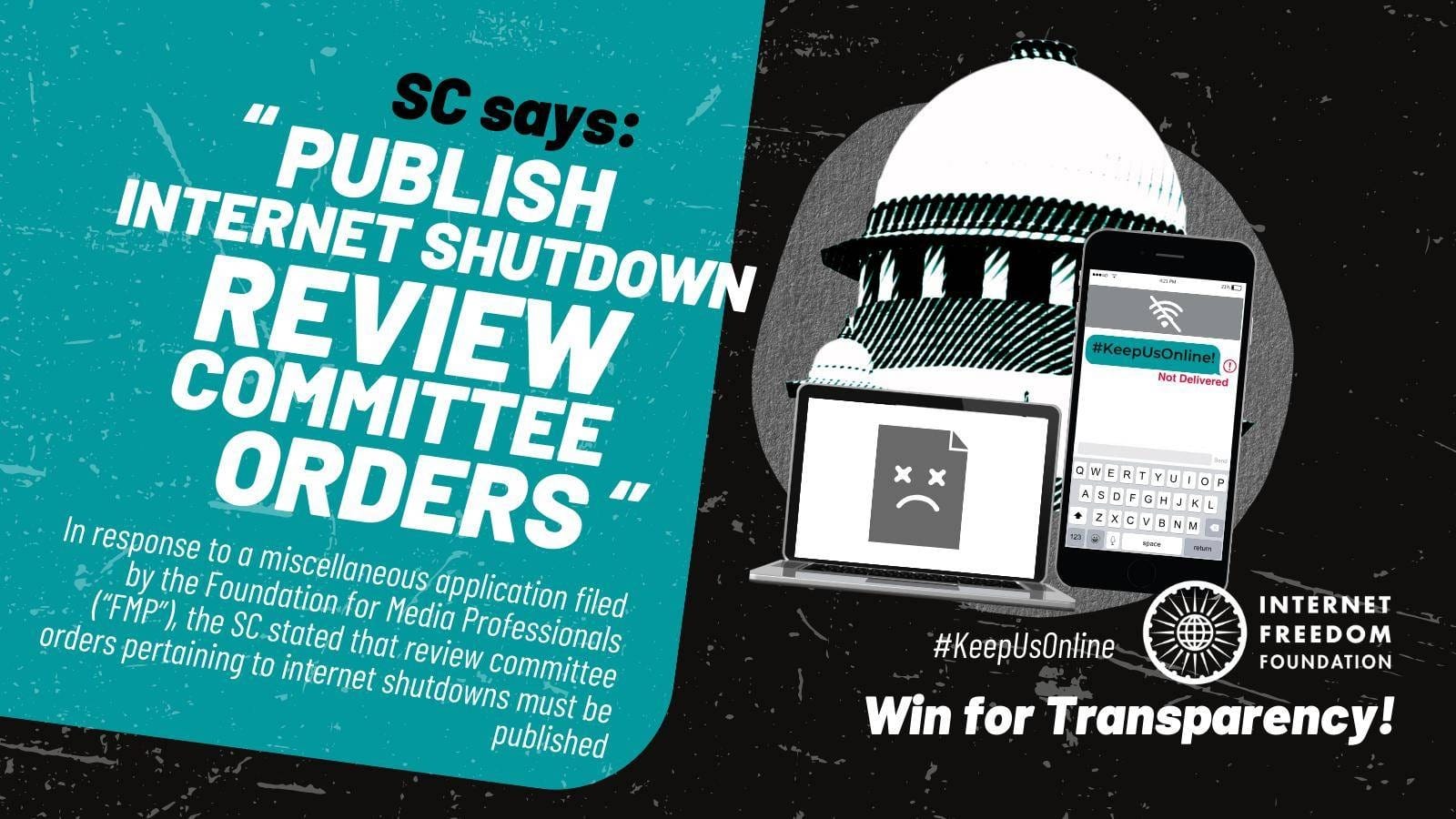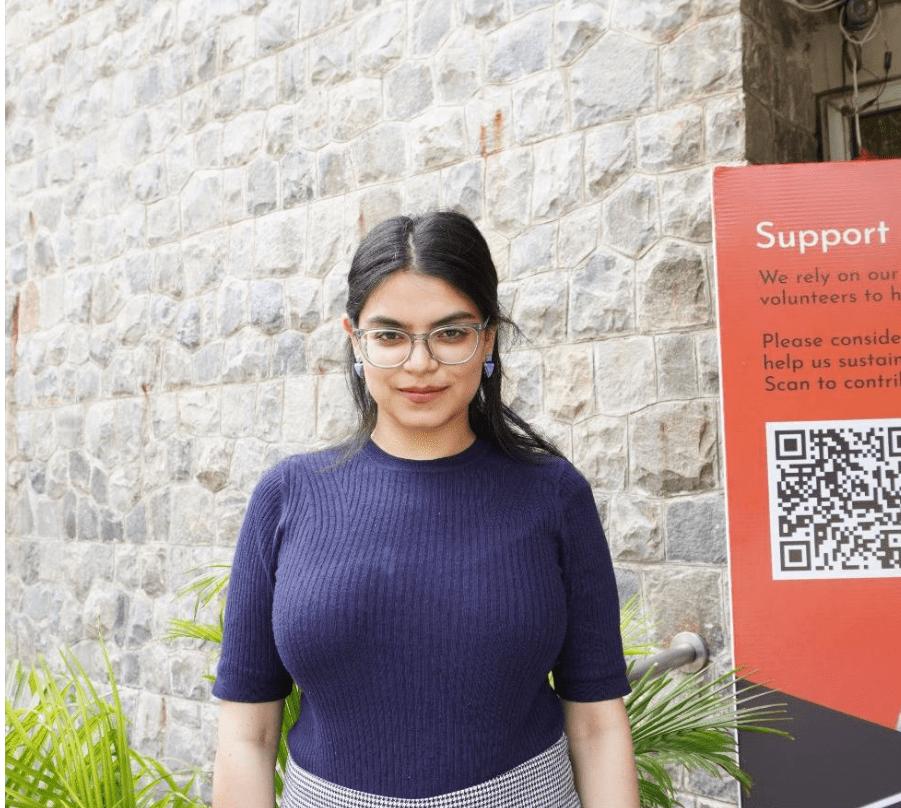
tl;dr
The Supreme Court of India has held that review orders relating to internet suspensions must be published, although the deliberations of the review committee need not be published. These observations were made in response to a miscellaneous application filed by the Foundation for Media Professionals (“FMP”) in the case of Foundation for Media Professionals v. Union Territory of Jammu (“4G Judgment”). This application sought to obtain the release of the findings of the review committee in accordance with the Supreme Court's ruling in Anuradha Bhasin v. Union of India.
Why should you care?
In Anuradha Bhasin v. Union of India, the Supreme Court ruled that orders instituting internet shutdowns must be published. This requirement also extends to the review committee under Rule 2(5) of the Temporary Suspension of Telecom Services (Public Emergency or Public Safety) Rules, 2017 (‘Telecom Suspension Rules’), serving as an oversight mechanism to ensure the legality and necessity of internet shutdowns. The lack of access to review committee orders hinders citizens' ability to challenge illegal and arbitrary internet shutdowns. Therefore, the publication of review committee orders is essential for fostering a culture of transparency and accountability.
Background
On May 11, 2020, the Supreme Court delivered the 4G Judgment in a petition filed by the FMP seeking restoration of 4G mobile internet services in Jammu & Kashmir during the COVID-19 pandemic. The Supreme Court constituted a Special Committee comprising (i) Secretary, Ministry of Home Affairs, (ii) Secretary, Department of Telecommunications, and (iii) Chief Secretary, Government of Jammu & Kashmir to immediately review the 4G mobile internet ban. In particular, the Special Committee was directed to examine the material placed on record by all parties and consider the viability of less restrictive alternatives suggested by the petitioner.
Due to the unavailability of any information on the functioning of the Special Committee in the public domain, FMP was constrained to file a contempt petition. It is further important to mention that subsequent to the judgment, orders imposing internet suspension which had neither been reviewed by the review committee nor the Special Committee had also been passed. Aggrieved by how such restrictions on the internet were being imposed, without any sense of “emergency” or “urgency”, we filed a Miscellaneous Application on behalf of FMP seeking compliance with Anuradha Bhasin as well as the Telecom Suspension Rules.
Proceedings before the Supreme Court
On behalf of FMP, IFF filed a miscellaneous application seeking the publication of orders of the review committee passed in Jammu and Kashmir, which were being withheld from publication. Previously, in 2021, FMP had sent a legal notice to the Union Territory of Jammu and Kashmir seeking the publication of the orders of the review committee concerning a spate of internet suspensions in the UT.
On February 23, 2024, Mr. Shadan Farasat appearing on behalf of FMP argued that, according to Annruadha Bhasin v. Union of India, all orders under the Telecom Suspension Rules 2017 must be published. This requirement extends to review committee orders as well, which are currently not being published.
Mr. Tushar Mehta, Solicitor General, appeared on behalf of J&K and opposed the publication of the same. At this point, Mr. Farasat submitted a compilation of review committee orders that were obtained by IFF through RTI requests, demonstrating that orders across states and union territories were being published.
On January 31, 2024, during the proceedings, the bench recorded that prima facie it was of the view that the orders of the review committee must be published, not the deliberations of the committee need not be published. The Court also orally observed that orders of the review committee “could not be kept in a cupboard”.
In the order dated February 23, 2024, the Court noted that while the prayer of the miscellaneous application did not specifically request the publication of the review committee orders, it acknowledged that these orders also affect the rights of parties. Consequently, the court held that “though it may not be necessary to notify the deliberations of the Reviewing Committee, it will be necessary to publish the final order”. As a result, the application was disposed of.
By emphasizing the necessity of publishing review orders, this order ensures that the review committee oversight remains open to public scrutiny. This promotes trust in governmental actions and safeguards citizens' rights. Such a directive represents a significant stride towards fostering a culture of transparency and accountability in combating illegal and arbitrary internet shutdowns. We are deeply grateful to FMP for granting us the opportunity to assist them in a matter of such paramount importance and for entrusting us in this crucial fight for digital rights!
We are immensely grateful to Advocate Shadan Farasat for leading us in the matter. He was assisted by Advocate Natasha Maheshwari, and IFF’s Legal Team comprising Advocates Gautam Bhatia, Vrinda Bhandari, Abhinav Sekhri, Radhika Roy, and Gayatri Malhotra.

